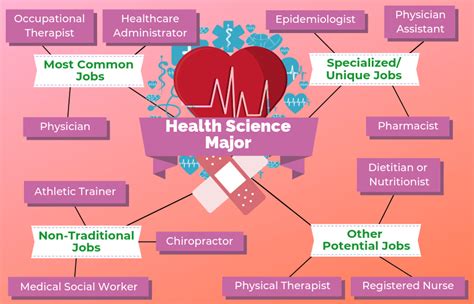A health science major is an interdisciplinary field of study that combines the principles of science, public health, and healthcare to provide a comprehensive understanding of health and wellness. It equips students with the knowledge and skills necessary to work in a wide range of healthcare settings, including hospitals, clinics, research institutions, and public health agencies.

Importance of Health Science
The importance of health science cannot be overstated. According to the World Health Organization (WHO), health is “a state of complete physical, mental and social well-being and not merely the absence of disease or infirmity.” In other words, health encompasses not just the physical body but also the emotional, psychological, and social aspects of an individual’s life.
The healthcare industry is one of the largest and fastest-growing sectors globally. As the population ages and the prevalence of chronic diseases increases, the demand for qualified healthcare professionals is expected to surge. A degree in health science provides a solid foundation for a successful career in this dynamic field.
Benefits of Studying Health Science
Pursuing a health science major offers numerous benefits, including:
- Broad knowledge base: Students gain a comprehensive understanding of human health, including anatomy, physiology, nutrition, epidemiology, and public health.
- Career versatility: Graduates have a wide range of career options in healthcare, including medical research, clinical practice, health education, and public health administration.
- Job security: The healthcare industry is recession-proof, and there is always a strong demand for qualified health professionals.
- High earning potential: According to the Bureau of Labor Statistics (BLS), the median salary for health science professionals is $62,290 per year.
- Personal fulfillment: Helping others improve their health and well-being can be a rewarding and fulfilling career path.
Curriculum of a Health Science Major
The curriculum of a health science major typically includes coursework in the following areas:
- Natural sciences: Biology, chemistry, physics
- Health sciences: Anatomy, physiology, nutrition, microbiology
- Social sciences: Psychology, sociology, anthropology
- Public health: Epidemiology, biostatistics, environmental health
- Research methods: Statistics, research design, data analysis
Students may also choose to specialize in a particular area of health science, such as clinical research, public health policy, or health education.
Career Paths for Health Science Graduates
Graduates with a health science degree have a wide range of career options, including:
- Clinical research: Design and conduct clinical trials to evaluate the safety and efficacy of new drugs and therapies.
- Public health: Work to improve the health of communities by developing and implementing public health programs and policies.
- Health education: Teach individuals and communities about health and wellness, promote healthy behaviors, and prevent disease.
- Healthcare administration: Manage healthcare organizations, including hospitals, clinics, and nursing homes.
- Medical writing: Write scientific articles, patient education materials, and other healthcare-related content.
Tips for Choosing a Health Science Program
When choosing a health science program, it is important to consider factors such as:
- Accreditation: The program should be accredited by a reputable organization, such as the Accreditation Council for Education in Health Professions (ACEHP).
- Curriculum: The program should offer a comprehensive curriculum that covers the core areas of health science.
- Faculty: The program should have experienced and qualified faculty with expertise in health science.
- Location: The program should be located in an area that offers opportunities for internships and clinical experience.
- Cost: The program should be affordable considering the potential return on investment.
Conclusion
A health science major provides a solid foundation for a successful career in the healthcare industry. It equips students with the knowledge and skills necessary to work in a wide range of healthcare settings and make a positive impact on the health and well-being of others. Graduates have a strong understanding of human health, a broad range of career options, and the potential for high earning potential.
